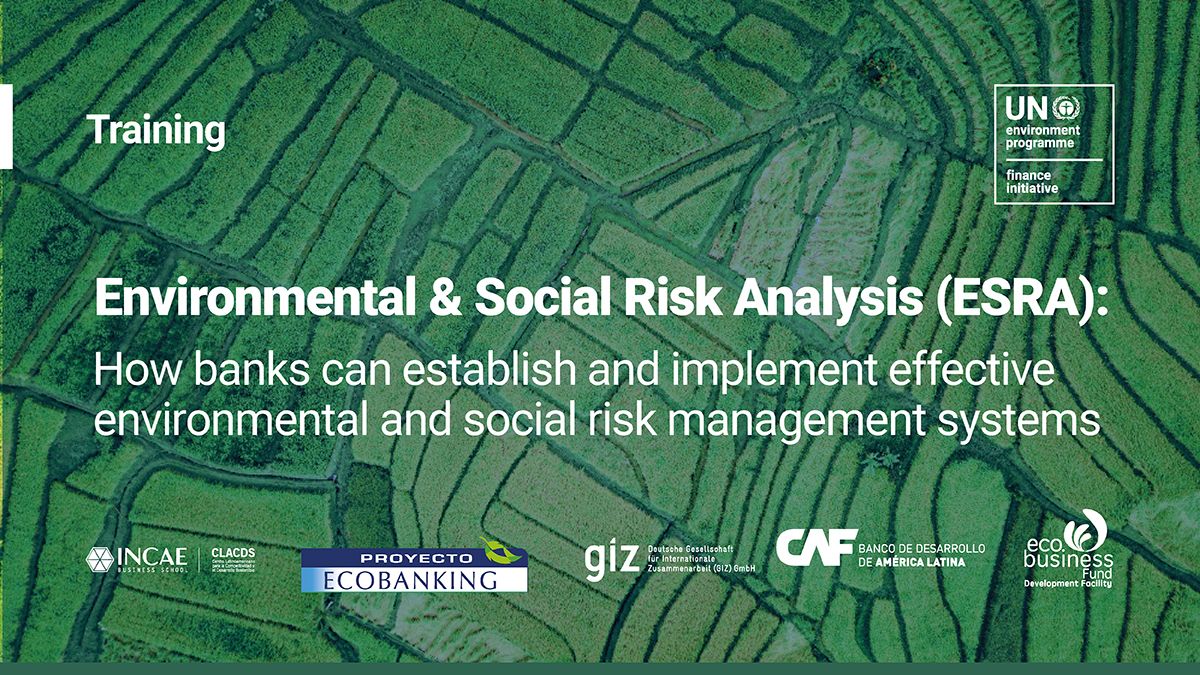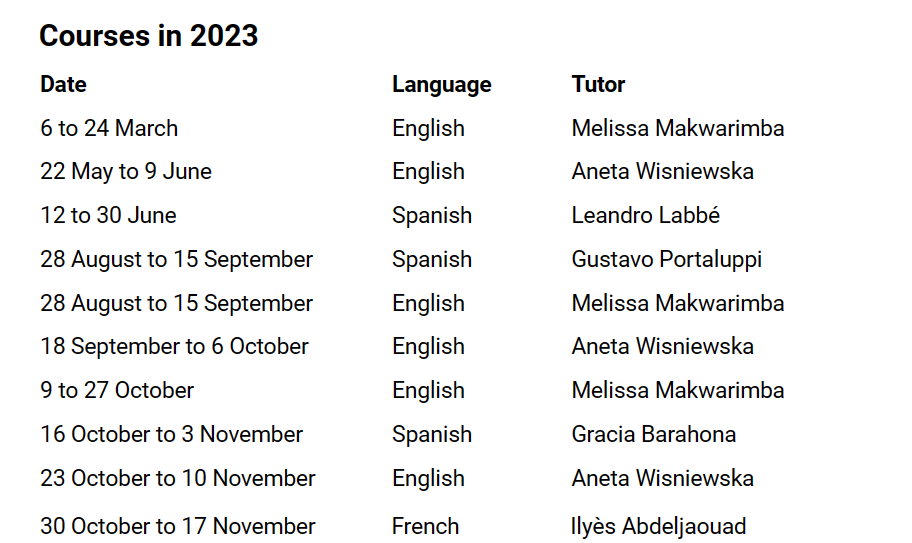The Environmental & Social Risk Analysis (ESRA) : UNEP FI

![]()
Next course in English from 23 October to 10 November.
The United Nations Environment Programme Finance Initiative (UNEP FI) is a partnership between UNEP and the global financial sector to mobilize private sector finance for sustainable development. UNEP FI works with more than 500 members – banks, insurers, and investors – and over 100 supporting institutions – to help create a financial sector that serves people and planet while delivering positive impacts. UNEP FI aims to inspire, inform and enable financial institutions to improve people’s quality of life without compromising that of future generations. By leveraging the UN’s role, UNEP FI accelerates sustainable finance.
Join our online ESRA course to learn how to identify, analyse and manage environmental and social risks generated through lending and investment activities. An essential resource for risk managers, credit analysts and relationship managers interested in taking their first steps in environmental, social and governance and climate risk management.
The Environmental & Social Risk Analysis (ESRA) online course provides in-depth and personalised training. Tutors engage with participants online on a daily basis, providing guidance and facilitating debates. As a participant, you will be involved in a range of activities, from simulating implementation of environmental and social policies and guidelines and analysing case studies, to carrying out exercises based on your own clients’ environmental and social impacts.
Access the course brochure or directly access to the applications form.

Target audience
Risk managers and analysts in commercial, corporate, investment and retail banking in or dealing with developing countries and emerging markets.
A limited number of places are also available for representatives from relevant stakeholder audiences including: supervisory/regulatory bodies, banking associations, government agencies, academic institutions, NGOs and civil society organisations involved in finance and sustainability issues.
In order to keep the high quality of our personalized course, the maximum number of participants per course is 24.
Please note that places for non-financial institution representatives are limited. Courses will not address how to financially analyse or how to set up a business plan for an environmental/socially oriented project in search of funding. The courses teach participants how to include environmental and social variables in the traditional analysis made by financial analysts when making lending and/or investment decisions, whatever the nature of the project.
Objectives & content
During the course participants will learn how to:
- Recognise environmental and social risks derived from your clients’ activities.
- Analyse the environment in which your clients operate to detect the environmental and social risks involved in their activities.
- Identify, offset and evaluate environmental and social risks taken by your clients.
- Improve your current risk management procedures.
- Institutionalise environmental risk analysis in your operations.
- Identify and understand market opportunities resulting from environmental and social risk analysis.
- Achieve a competitive advantage through risk reduction and value creation.
Each course is made up of five consecutive modules:
- Introduction to Sustainable Finance
- Identification of Environmental and Social Risks
- Categorization
- Evaluation of Environmental and Social Risks
- Administration of Environmental and Social Risks
Course contents and materials can only be accessed by participants. The course modules cannot be disaggregated.
Access the course programme.
Duration and time commitment
Three weeks for two hours per day on average, Monday to Friday.
The timetable is flexible, participants can set their own study times.
Costs

*Please note that course fees serve exclusively to cover the costs of running the course and all payments for the ESRA courses are final and no refund will be given.
*5% group discounts (3 or more people from the same Financial Institution in the same course edition).
Since 2015, a new Cancellation Policy has been introduced. Participants who cancel their participation in a course once it has started and wish to be placed in a future edition will receive as a courtesy a 10% discount on the tuition for that future course. The course is highly customized, and these late cancellations create costs for the organizers and deny the position in the course to others who were turned away.
Applications
All applications should be submitted via our online form at least one week prior to the course you wish to participate in. Please consult our FAQs concerning applications.
Online registration: English | Spanish | French
Please note that participants need to have a very good command of the language of the course they will be taking.
Testimonials
Overall, over 150 ESRA online courses have taken place in English, French, Chinese and Spanish with over 3,000 participants from 125 countries since 2006. Read participants’ testimonials below or access the ESRA survey result to find out more about their experience.
“I found ESRA course to be very useful. It provides a comprehensive list of topics to consider, enquire, and engage the client with. The format emphasized the importance of the sustainability of raw materials and the impact of climate change, both of which were areas that supported my own considerations. The HR practices on diversity and inclusion were definitely encouraging and important to highlight as a key factor when assessing risk. The online design and structure of the course enabled many of us to balance our time between our daily responsibilities and taking this course. Thank you for this opportunity. The ESRA course acts as a guide to drive Q&A in the client meetings and as a reminder for completeness. It also helps to consider the significance of each type of issue, while acknowledging that “in progress” efforts do help mitigate risks, giving some credit to the client.” – Mari Freigang Ogura, Head of Central Services, Group Shareholding Reporting, UBS, Switzerland
“Thanks for your guidance and it was great learning from you on the finer aspects of ESRA. The three weeks were very valuable indeed and the learnings will greatly help direct my engagements in E&S risk assessments. The ESRA course definitely helps to deal with the E&S risks assessment process by breaking down the various thematic variables and bucketing responses. This allows the Analyst to have a good grip on the risk assessment with likely scenarios and prioritize areas requiring greater focus. The ESRA course is no doubt a great tool for engaging with the client/management to better understand risk areas and their likely impact. The course was helpful, well-structured and professionally delivered. Detailed comments on the exercises by the Tutor, Melissa, were insightful and I also gathered a lot from the forums where participants in the cohort put forth interesting perspectives.” – Ribhu Ranjan Baruah, Manager, NEDFi Venture Capital, India
“I wanted to thank you for all the feedback you gave during the last 3 weeks. The ESRA course was very helpful and explored further details which covered many topics that were not initially envisaged. This is a great tool to screen a project and raise potential issues with a client.” – Thibault Neveu, Investment Officer, LION’S HEAD GLOBAL PARTNERS, United Kingdom
“The formats have been very useful when going through all the topics in the assessment of E&S risks. They provide clarity and structure to the assessment, which is highly appreciated, due to the complexity of the topic. The forms, as well as your comments on my exercise, have supported me in the understanding and the structuring of all the relevant topics to be considered when evaluating such projects” – Guadalupe Landa Rosas, Head of Department, Raiffeisen Bank International, Austria
“I wanted to take a moment to tell you that I have really enjoyed the course. The material, and in particular your detailed feedback on the exercises have been extremely helpful. All this learning will be very useful as I continue to interact more with FIs” – Raquel Gomez, Case Research Analyst, World Bank Group (CAO office), United States
“Many thanks to Christina and the entire team of participants for the invaluable experience. I enjoyed the forums and particularly seeing how different people assessed different issues” – Daniel Msoni, Credit Analysis Specialist, Zambia National Commercial Bank, Zambia
“Thank you to you and your colleagues for developing the course. It was interesting and I learnt very much. Best of all, I now have solid reasons to advise communities to complain to the banks when their livelihoods are threatened” – Marika van der Welt ,Self employed lawyer, South Africa
“I wanted to take this opportunity to say a very big thank you for your assistance over the last ~4 weeks. It has given me great motivation to engage in various discussions and to drive further change within the organisation so much so that I am meeting with some of the senior executive panel next week to discuss how we may be able to re-shape our current framework” – Prash Odhavji, Senior Manager – Sustainable Finance, Australia and New Zealand Banking Group, Hong Kong
“Wow! Thank you so much for this detailed and useful feedback. The ESRA, along with your feedback was insightful, particularly in regards to comprehensive consideration of biodiversity, and habitat health in ESG performance. It also really reinforced my thinking as a practitioner on disaggregating impacts by time-horizon, and the implications on risk analysis and evaluation” – Caroline Kathambi, Senior Consultant, African Development Bank, Kenya
Training partners
The ESRA online course is a product of UNEP FI, the Deutsche Gesellschaft für Internationale Zusammenarbeit (GIZ) GmbH, and the INCAE Business School, with the support of the Ecobanking Project.
Initially developed in Spanish in 2006 by the UNEP FI Latin American Regional Task Force, with the support of Bank of America, the English-language edition of the course was produced in 2007 thanks to the support of FMO. The French edition of the course was produced in 2010 thanks to the support of DEG – Deutsche Investitions-und Entwicklungsgesellschaft mbH (“DEG”), Promotion et Participation pour la Coopération économique (Proparco) and the Agence Française de Développement (AFD).
The course material has been updated in 2020/2021 with the support of the Sustainability Academy, an initiative of the eco.business Fund Development Facility and CAF – Latin American Development Bank.

